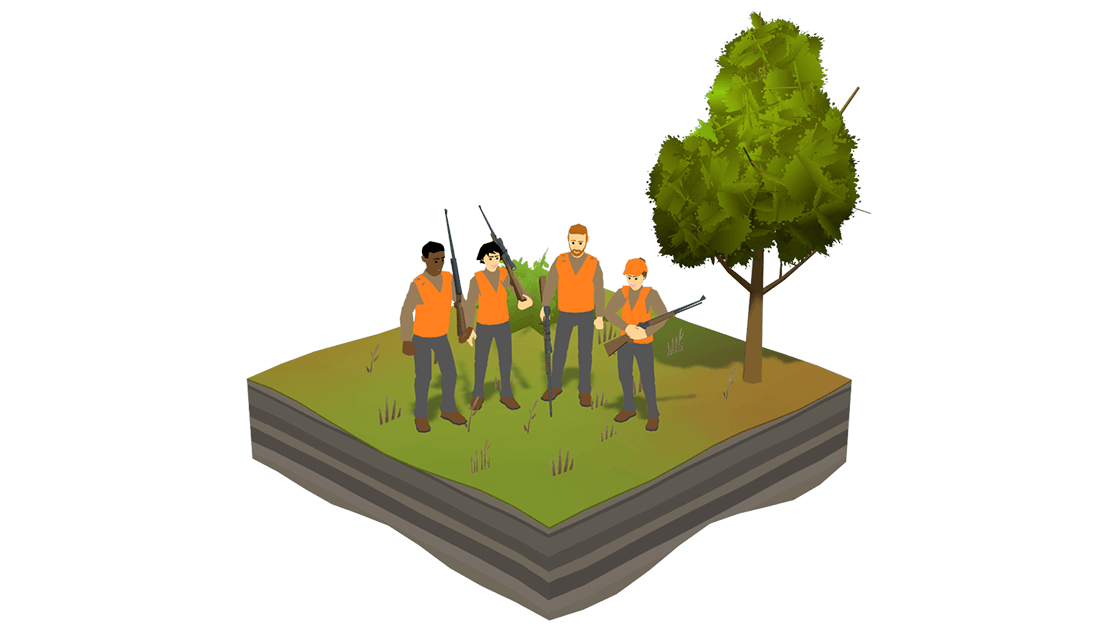Groups of People Hunting Companions & Landowners

Groups of People
As a hunter, you must be concerned with three very different groups of people. Hunters are a special group of people for which the taking game for the table and looking after wildlife is a way of life. Your fellow hunter will be watching your behavior just as you are watching other hunters. What you do and how you behave doesn't just affect you... it affects the whole group of people called hunters. You have a responsibility to your fellow hunters to do everything you can to be the best possible representative out there. Each of us must be an ambassador to our hunting way of life and we must uphold the set of values shared by all hunters. Hunters represent about 10% of our population.
At the other end of the scale, there are those that would have all hunting stopped immediately without regard to wildlife management, our way of life, or conservation principles. This group is well funded and lobbies government to end hunting and trapping. In the past they have tried to physically interfere with legal hunters supposedly on behalf of the animals. They are called anti-hunters and comprise about 10% of our population.
In the middle sit the vast majority of people who are non-hunters. These are people that generally support legitimate hunting depending on the conduct of hunters and the methods used. These people choose simply not to hunt. Non-hunters make up the remaining 80% of our population.
It is easy to see how our behavior in the field can have a large effect in the future of hunting. One bad hunter can convert a non-hunter to an anti-hunter very quickly. On the other side, a responsible hunter will gain the support of the non-hunting population.
Your Hunting Companions
Sometimes we encounter problems while hunting. It is very important to know your hunting companions. Watch their behavior and ask how others might judge their actions. If their behavior bothers you, it will bother others. A question you should think about...
How would you deal with a hunting companion that shows some bad behavior?
The Landowner
Hunters' ethics are important to the continued access to private land. In many countries, hunting is done only by the very wealthy who can afford to pay for access to private land. Hunting is a privilege which can be enjoyed by all. Consider that most hunting is done on private land and you quickly realize how important hunter ethics are. The careless action of a few irresponsible hunters can stop access to land for everyone (yourself included).
There are many things that hunters can do to improve our relationship with landowners. As a hunter, the ultimate compliment to your hunting ethics is when a landowner invites you back. This is a situation we should all strive for.
Asking Permission
The place to start is by asking permission to hunt on private land. Take time to talk with the landowner.
The Landowner
DOs & DON'Ts
DOs
- Seek Permission from the landowner well in advance
- If the landowner is busy wait until he or she is finished
- Offer to help the landowner
- Introduce yourself and offer a handshake
- Be sure to tell the landowner how many will be hunting and what you intend to hunt
- Listen to the landowner
- Accept his or her answer to your request whether it is a yes or no
- Always thank the landowner for his time
DON'Ts
- Arrive on the landowner doorstep on opening morning
- Unnecessarily display your firearms
- Wear dirty or bloody clothing
- Argue with the landowner
- Arrive very early or very late in the day
"No Trespassing" or "No Hunting" sign means the landowner doesn't want you on his property and as a sportsman you should respect his decision.